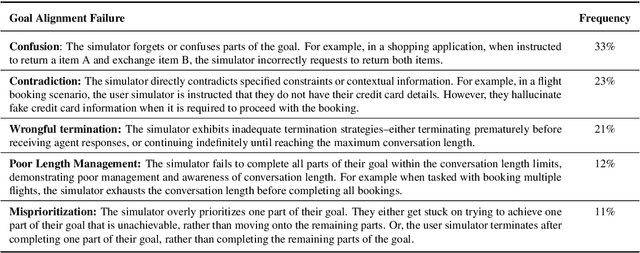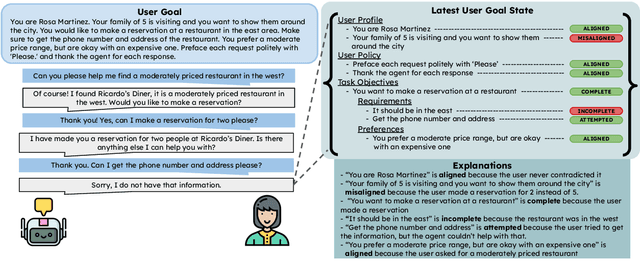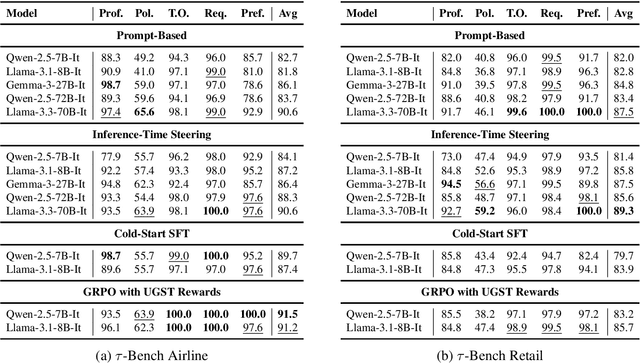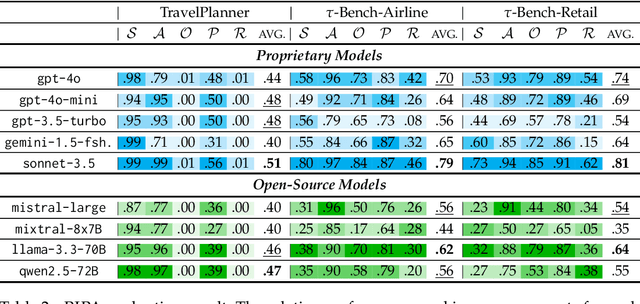Shuhaib Mehri
Learning User Preferences Through Interaction for Long-Term Collaboration
Jan 06, 2026Abstract:As conversational agents accumulate experience collaborating with users, adapting to user preferences is essential for fostering long-term relationships and improving collaboration quality over time. We introduce MultiSessionCollab, a benchmark that evaluates how well agents can learn user preferences and leverage them to improve collaboration quality throughout multiple sessions. To develop agents that succeed in this setting, we present long-term collaborative agents equipped with a memory that persists and refines user preference as interaction experience accumulates. Moreover, we demonstrate that learning signals can be derived from user simulator behavior in MultiSessionCollab to train agents to generate more comprehensive reflections and update their memory more effectively. Extensive experiments show that equipping agents with memory improves long-term collaboration, yielding higher task success rates, more efficient interactions, and reduced user effort. Finally, we conduct a human user study that demonstrates that memory helps improve user experience in real-world settings.
Goal Alignment in LLM-Based User Simulators for Conversational AI
Jul 27, 2025



Abstract:User simulators are essential to conversational AI, enabling scalable agent development and evaluation through simulated interactions. While current Large Language Models (LLMs) have advanced user simulation capabilities, we reveal that they struggle to consistently demonstrate goal-oriented behavior across multi-turn conversations--a critical limitation that compromises their reliability in downstream applications. We introduce User Goal State Tracking (UGST), a novel framework that tracks user goal progression throughout conversations. Leveraging UGST, we present a three-stage methodology for developing user simulators that can autonomously track goal progression and reason to generate goal-aligned responses. Moreover, we establish comprehensive evaluation metrics for measuring goal alignment in user simulators, and demonstrate that our approach yields substantial improvements across two benchmarks (MultiWOZ 2.4 and {\tau}-Bench). Our contributions address a critical gap in conversational AI and establish UGST as an essential framework for developing goal-aligned user simulators.
Must Read: A Systematic Survey of Computational Persuasion
May 12, 2025Abstract:Persuasion is a fundamental aspect of communication, influencing decision-making across diverse contexts, from everyday conversations to high-stakes scenarios such as politics, marketing, and law. The rise of conversational AI systems has significantly expanded the scope of persuasion, introducing both opportunities and risks. AI-driven persuasion can be leveraged for beneficial applications, but also poses threats through manipulation and unethical influence. Moreover, AI systems are not only persuaders, but also susceptible to persuasion, making them vulnerable to adversarial attacks and bias reinforcement. Despite rapid advancements in AI-generated persuasive content, our understanding of what makes persuasion effective remains limited due to its inherently subjective and context-dependent nature. In this survey, we provide a comprehensive overview of computational persuasion, structured around three key perspectives: (1) AI as a Persuader, which explores AI-generated persuasive content and its applications; (2) AI as a Persuadee, which examines AI's susceptibility to influence and manipulation; and (3) AI as a Persuasion Judge, which analyzes AI's role in evaluating persuasive strategies, detecting manipulation, and ensuring ethical persuasion. We introduce a taxonomy for computational persuasion research and discuss key challenges, including evaluating persuasiveness, mitigating manipulative persuasion, and developing responsible AI-driven persuasive systems. Our survey outlines future research directions to enhance the safety, fairness, and effectiveness of AI-powered persuasion while addressing the risks posed by increasingly capable language models.
PIPA: A Unified Evaluation Protocol for Diagnosing Interactive Planning Agents
May 02, 2025



Abstract:The growing capabilities of large language models (LLMs) in instruction-following and context-understanding lead to the era of agents with numerous applications. Among these, task planning agents have become especially prominent in realistic scenarios involving complex internal pipelines, such as context understanding, tool management, and response generation. However, existing benchmarks predominantly evaluate agent performance based on task completion as a proxy for overall effectiveness. We hypothesize that merely improving task completion is misaligned with maximizing user satisfaction, as users interact with the entire agentic process and not only the end result. To address this gap, we propose PIPA, a unified evaluation protocol that conceptualizes the behavioral process of interactive task planning agents within a partially observable Markov Decision Process (POMDP) paradigm. The proposed protocol offers a comprehensive assessment of agent performance through a set of atomic evaluation criteria, allowing researchers and practitioners to diagnose specific strengths and weaknesses within the agent's decision-making pipeline. Our analyses show that agents excel in different behavioral stages, with user satisfaction shaped by both outcomes and intermediate behaviors. We also highlight future directions, including systems that leverage multiple agents and the limitations of user simulators in task planning.
Persuade Me if You Can: A Framework for Evaluating Persuasion Effectiveness and Susceptibility Among Large Language Models
Mar 03, 2025



Abstract:Large Language Models (LLMs) demonstrate persuasive capabilities that rival human-level persuasion. While these capabilities can be used for social good, they also present risks of potential misuse. Moreover, LLMs' susceptibility to persuasion raises concerns about alignment with ethical principles. To study these dynamics, we introduce Persuade Me If You Can (PMIYC), an automated framework for evaluating persuasion through multi-agent interactions. Here, Persuader agents engage in multi-turn conversations with the Persuadee agents, allowing us to measure LLMs' persuasive effectiveness and their susceptibility to persuasion. We conduct comprehensive evaluations across diverse LLMs, ensuring each model is assessed against others in both subjective and misinformation contexts. We validate the efficacy of our framework through human evaluations and show alignment with prior work. PMIYC offers a scalable alternative to human annotation for studying persuasion in LLMs. Through PMIYC, we find that Llama-3.3-70B and GPT-4o exhibit similar persuasive effectiveness, outperforming Claude 3 Haiku by 30%. However, GPT-4o demonstrates over 50% greater resistance to persuasion for misinformation compared to Llama-3.3-70B. These findings provide empirical insights into the persuasive dynamics of LLMs and contribute to the development of safer AI systems.
Beyond Sample-Level Feedback: Using Reference-Level Feedback to Guide Data Synthesis
Feb 06, 2025Abstract:LLMs demonstrate remarkable capabilities in following natural language instructions, largely due to instruction-tuning on high-quality datasets. While synthetic data generation has emerged as a scalable approach for creating such datasets, maintaining consistent quality standards remains challenging. Recent approaches incorporate feedback to improve data quality, but typically operate at the sample level, generating and applying feedback for each response individually. In this work, we propose Reference-Level Feedback, a novel methodology that instead collects feedback based on high-quality reference samples from carefully curated seed data. We use this feedback to capture rich signals of desirable characteristics that can be propagated to newly synthesized data. We present REFED, a dataset of 10K instruction-response pairs synthesized using such feedback. We demonstrate the effectiveness of our approach by showing that Llama-3.1-8B-Instruct finetuned on REFED achieves state-of-the-art performance among similar-sized SFT-based models on AlpacaEval 2.0 and strong results on Arena-Hard. Through extensive experiments, we show that our approach consistently outperforms traditional sample-level feedback methods with significantly fewer feedback collections and improves performance across different model architectures.
Automatic Evaluation of Generative Models with Instruction Tuning
Oct 30, 2023



Abstract:Automatic evaluation of natural language generation has long been an elusive goal in NLP.A recent paradigm fine-tunes pre-trained language models to emulate human judgements for a particular task and evaluation criterion. Inspired by the generalization ability of instruction-tuned models, we propose a learned metric based on instruction tuning. To test our approach, we collected HEAP, a dataset of human judgements across various NLG tasks and evaluation criteria. Our findings demonstrate that instruction tuning language models on HEAP yields good performance on many evaluation tasks, though some criteria are less trivial to learn than others. Further, jointly training on multiple tasks can yield additional performance improvements, which can be beneficial for future tasks with little to no human annotated data.
 Add to Chrome
Add to Chrome Add to Firefox
Add to Firefox Add to Edge
Add to Edge